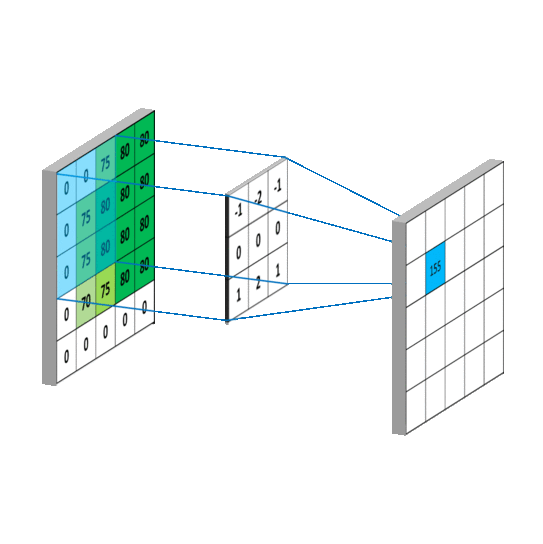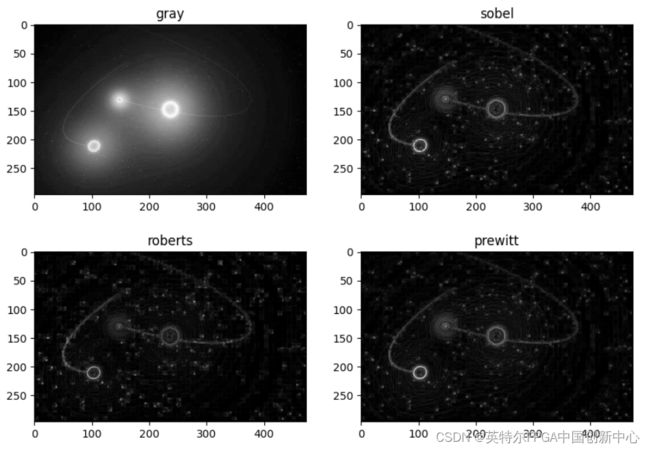图像边缘检测
文章目录
- 前言
- 一、图像边缘检测
- 二、边缘检测算子
-
- 1. Roberts算子
- 2. Prewitt算子
- 3. Sobel算子
- 三、代码实现
- 总结
前言
有了图像放大缩小,图像灰度化处理等相关基础知识过后,就可以进行图像边缘检测了。边缘检测最后也会在FPGA上面实现,此处小编已经控制不住要剧透了。也是一样,先从软件的角度来理解这些图像边缘检测算法。
一、图像边缘检测
边缘检测原理如下动态图所示。假如你有一些别人发明的算子,算子在第二章介绍。使用算子在原图上进行扫描,算子中的值乘以对应的像素值,然后加起来就行了。你可以使用截图工具,截取动态图,计算一下是否正确。

二、边缘检测算子
算子其实就是滤波器,在深度学习里面又叫卷积,下面3种算子给出了具体的值,而在卷积神经网络里面,卷积核的值是需要训练得到。
1. Roberts算子
G x = [ 1 0 0 − 1 ] G y = [ 0 − 1 1 0 ] G_x = \begin{bmatrix} 1 & 0 \\ 0 & -1 \end{bmatrix} \quad\quad\quad G_y = \begin{bmatrix} 0 & -1 \\ 1 & 0 \end{bmatrix} Gx=[100−1]Gy=[01−10]
2. Prewitt算子
G x = [ − 1 0 1 − 1 0 1 − 1 0 1 ] G y = [ − 1 − 1 − 1 0 0 0 1 1 1 ] G_x = \begin{bmatrix} -1 & 0 & 1\\ -1 & 0 & 1\\ -1 & 0 & 1 \end{bmatrix} \quad\quad\quad G_y = \begin{bmatrix} -1 & -1 & -1\\ 0 & 0 & 0\\ 1 & 1 & 1 \end{bmatrix} Gx= −1−1−1000111 Gy= −101−101−101
3. Sobel算子
G x = [ − 1 0 + 1 − 2 0 + 2 − 1 0 + 1 ] G y = [ + 1 + 2 + 1 0 0 0 − 1 − 2 1 ] G_x = \begin{bmatrix} -1 & 0 & +1\\ -2 & 0 & +2\\ -1 & 0 & +1 \end{bmatrix} \quad\quad\quad G_y = \begin{bmatrix} +1 & +2 & +1\\ 0 & 0 & 0\\ -1 & -2 & 1 \end{bmatrix} Gx= −1−2−1000+1+2+1 Gy= +10−1+20−2+101
三、代码实现
# robert算子
robert_x = np.array([[1, 0],
[0, -1]])
robert_y = np.array([[0, -1],
[1, 0]])
# prewitt算子
prewitt_x = np.array([[-1, 0, 1],
[-1, 0, 1],
[-1, 0, 1]])
prewitt_y = np.array([[1, 1, 1],
[0, 0, 0],
[-1, -1, -1]])
# sobel算子
sobel_x = np.array([[-1, 0, +1],
[-2, 0, +2],
[-1, 0, +1]])
sobel_y = np.array([[+1, +2, +1],
[0, 0, 0],
[-1, -2, -1]])
# 图像灰度处理
def weight_gray(image):
weight_image = image[:, :, 0] * 0.11 + image[:, :, 1] * 0.59 + image[:, :, 2] * 0.3
weight_image = weight_image.astype(np.uint8)
return weight_image
# 图像边缘检测
def edge_dimage(image, operator):
shape = image.shape
h, w = shape
sh, sw = operator[0].shape
sobel_image = np.zeros(image.shape)
for i in range(h - sh):
for j in range(w - sw):
ix = np.multiply(image[i: i + sh, j: j + sw], operator[0])
iy = np.multiply(image[i: i + sh, j: j + sw], operator[1])
ix = np.sum(ix)
iy = np.sum(iy)
ig = np.sqrt(ix ** 2 + iy ** 2)
sobel_image[i, j] = ig
sobel_image = sobel_image.astype(np.uint8)
return sobel_image
image = cv2.imread("three_body.jpg")
gray = weight_gray(image)
roimage = edge_dimage(gray, (robert_x, robert_y))
primage = edge_dimage(gray, (prewitt_x, prewitt_y))
sbimage = edge_dimage(gray, (sobel_x, sobel_y))
# 画子图
plt.figure(figsize=(10, 7))
plt.subplot(221)
plt.title("gray")
plt.imshow(gray, cmap='gray')
plt.subplot(222)
plt.title("sobel")
plt.imshow(sbimage, cmap='gray')
plt.subplot(223)
plt.title("roberts")
plt.imshow(roimage, cmap='gray')
plt.subplot(224)
plt.title("prewitt")
plt.imshow(primage, cmap='gray')
总结
这大概就是卷积神经网络的由来,以前叫做算子,现在叫做卷积。小编也迫不及待的想要动手实现卷积神经网络了(numpy),敬请期待。
